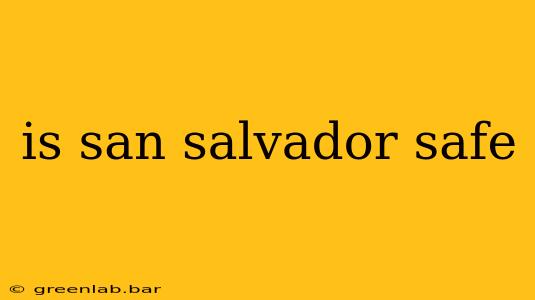San Salvador, the vibrant capital of El Salvador, is a city of contrasts. It boasts a rich history, stunning architecture, and a thriving cultural scene, but it also grapples with a reputation for high crime rates. So, is San Salvador safe? The answer, unfortunately, isn't a simple yes or no. Safety in San Salvador, like in many other large cities globally, depends heavily on the specific area, time of day, and your personal awareness and precautions.
Understanding the Safety Challenges in San Salvador
El Salvador has a history marked by gang violence, and this unfortunately impacts the perception and reality of safety in San Salvador. While the government has implemented initiatives to combat crime, including the deployment of security forces and social programs, challenges remain. Petty theft, such as pickpocketing and bag snatching, is a common concern, especially in crowded areas and at night. More serious crimes, while less frequent, still occur.
Areas to Exercise Caution:
Certain areas of San Salvador are statistically more prone to crime than others. It's crucial to research specific neighborhoods before visiting or staying in them. While specific neighborhood rankings fluctuate and information can become outdated quickly, consistently exercising caution is recommended.
Tourist Areas:
While tourist areas generally experience a higher police presence and lower crime rates compared to other neighborhoods, vigilance is still essential. Be aware of your surroundings, avoid walking alone at night, and be mindful of your belongings.
Staying Safe in San Salvador: Practical Tips and Advice
While the safety situation demands caution, it doesn't mean you should avoid San Salvador altogether. By taking proactive steps and exercising common sense, you can significantly reduce your risk.
Before You Go:
- Research your accommodation: Choose reputable hotels or guesthouses in safer areas. Check online reviews for insights into local safety.
- Inform yourself about current events: Stay updated on any travel advisories or warnings issued by your government. Local news sources can also provide valuable information.
- Share your itinerary: Let someone you trust know your travel plans, including your accommodation details and planned activities.
While in San Salvador:
- Stay aware of your surroundings: Avoid distractions like your phone while walking, especially in crowded areas.
- Avoid displaying expensive jewelry or electronics: This can make you a target for criminals.
- Use official taxis or ride-sharing services: Avoid unofficial taxis or hitchhiking.
- Stick to well-lit and populated areas: Avoid walking alone in dimly lit or isolated areas, especially at night.
- Learn basic Spanish phrases: Knowing a few basic phrases can be helpful in emergencies.
- Be cautious of strangers: Be wary of anyone who approaches you unexpectedly, especially if they seem overly friendly or insistent.
- Don't resist robbery: Your safety is paramount. Hand over valuables if confronted by criminals. Report the incident to the authorities afterward.
Beyond the Headlines: The Real San Salvador
Despite the safety concerns, San Salvador is a city with a vibrant culture and rich history. The warmth and resilience of its people are evident, and there are many safe and enjoyable experiences to be had. Focusing on well-lit, populated areas during the day and using common sense safety precautions greatly increases your chances of a positive and safe trip. Remember to thoroughly research your chosen neighborhoods and activities.
Disclaimer:
This information is intended to provide general guidance and should not be considered exhaustive. Safety conditions can change rapidly. Always consult up-to-date travel advisories and local news sources before and during your trip to San Salvador. Your personal safety is your responsibility.

